Explore the enchanting Kharga Oasis in Egypt's Western Desert. Discover its rich history, ancient temples, and stunning landscapes. Ideal for history buffs and adventure seekers.

| Overview | |
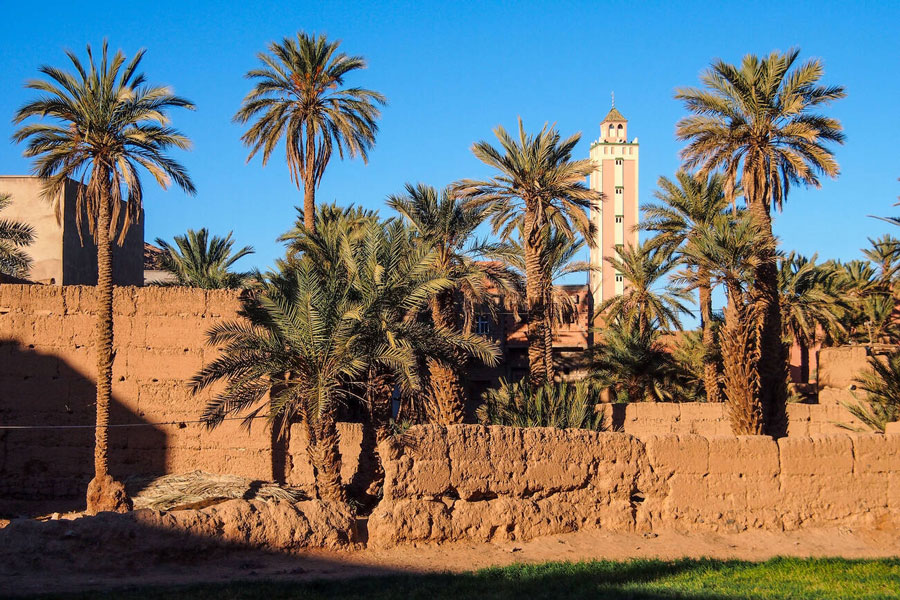
|
|
| Location | New Valley, Egypt |
| Area | 1,017 km2 |
| Population | 101,283 |
| Significance | Ancient Caravan Transit Point |
| Attractions | Temples, Ruins, Museum |
Kharga Oasis is a magical attraction filled with heavenly attractions worthy of exploring. The main goal of this article is to offer every traveler all the facts and information about Kharga Oasis. This article was written by a group of very skilled and knowledgeable tour operators, tour guides, and travel consultants who know all the details about Kharga Oasis.
In the vast sand ocean of the western desert lies the beautiful green Kharga Oasis, which lies out of the lifeless nature of the desert like a jewel in a pile of coal. It offers the best view of the stars and the most relaxing and complete experience imaginable. It is one of the best places in Egypt and the world, and it can reflect the natural beauty and culture of the Egyptian Oasis in the most majestic fashion.
The Kharga Oasis is located 550 km south of Cairo and 232 km south of Asyut; it is on the west bank of the Nile Valley, about 200 km west of the western desert. Occupying the eastern border of the governorate are the cities of Al Menya, Qena, and Asyut, and the Matruh governorate occupies its northern borders.
The Oasis was known as the Southern Oasis by the ancient Egyptians, and the Oasis Magna was known to the Romans as the largest oasis in the Libyan desert of Egypt. The Oasis is in a depression about 160 km (100 mi) long and from 20 km (12 mi) to 80 km (50 mi) wide.
The climate is 28°C, Wind N at 8 km/h, and Humidity at 23%. Kharga Oasis occupies around one-third of the entire land of Egypt and has around 20,000 inhabitants nowadays. Kharga Oasis is connected to the Nile Valley, which has a set of roads that go from Asyut to Kharga and from Farafra to Dakhla to Kharga.

The marvelous Kharga Oasis is known to have a hot desert climate, mostly clear skies and sunshine year-round, where the heat dominates the area most of the year, with average highs of around 38°C (100°F) from May to September. In the hottest months, June and July, average highs are around 42°C (108°F).
Winters are significantly milder than summers, which are still warm, with average highs hovering around 22°C (72 °F) from December to February. Nights can get chilly and drop to lows of around eight °C (46°F) in December and January. Rainfall is extremely low and averages less than 2mm annually.
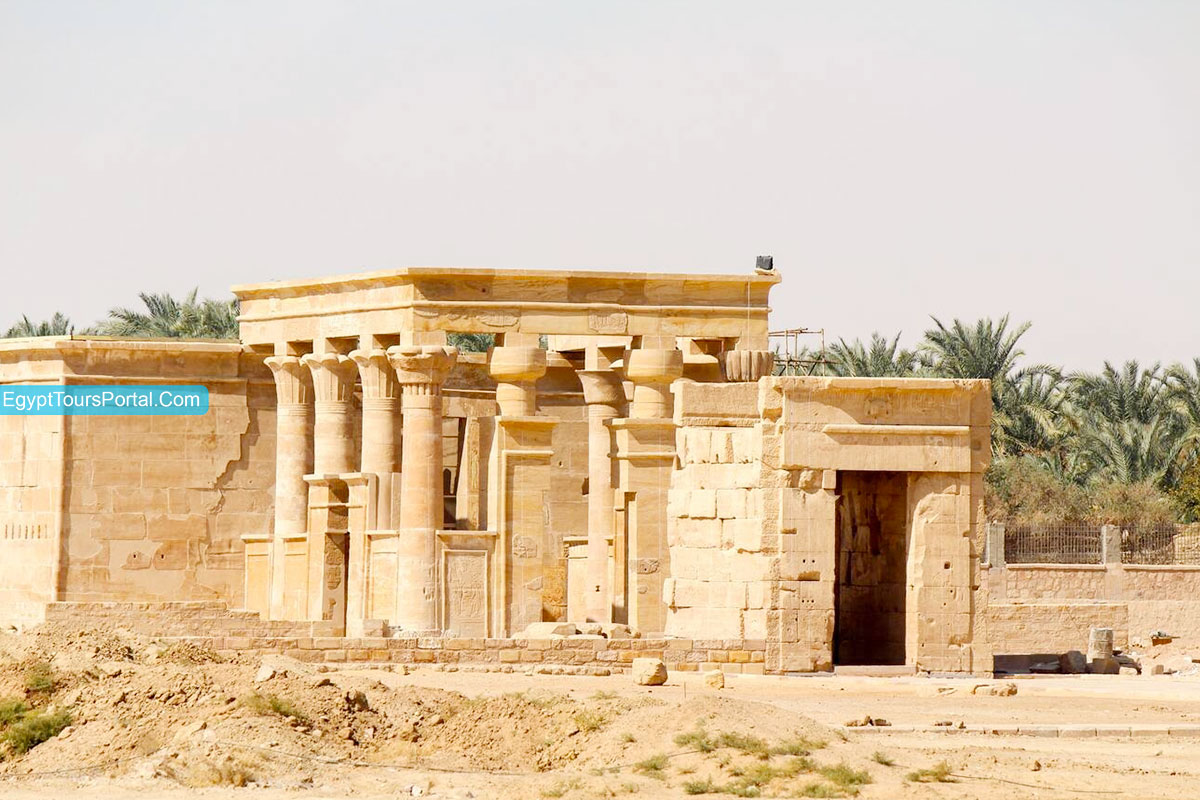
The Kharaga Oasis became very well known as an important transit point for the desert caravans in the 12th dynasty (1786 BC-1665 BC) of the middle kingdom when the Hyksos controlled northern Egypt and the Pharaohs controlled southern Egypt and Nubia. It acted as the southwestern gate or portal of Egypt because it was able to make a connection from Egypt all the way to southern Africa through a 40-day-long road. Archaeological evidence suggests a human presence in the Kharga Oasis dating back to 7,000 BC. Early inhabitants were likely drawn to the abundant water resources and fertile land compared to the surrounding desert.
Some historical evidence showcasing the city dates all the way to the Old Kingdom of Egypt (2700 BC –2200 BC) as a trade road in the Old Kingdom of Egypt (2700 BC –2200 BC) for gold, animals, spices, ivory, wheat, and plants. The Kharga Oasis during the 13th dynasty thrived as a stronghold, providing refuge for Egyptian Christians amidst the oppressive reign of Roman rule. This oasis, rich with history, revealed a plethora of monumental structures, passageways, artifacts, and ruins dating back to the Middle Kingdom of Egypt (2134-1569 BC) up to the New Kingdom of Egypt (1550-1050 BC).
Journey to Dakhla Oasis for its enchanting ancient monuments, spectacular scenery, and historic Egyptian artifacts.
Read MoreIt is worth mentioning that the renowned dagger of King Tutankhamun was crafted from an Iron Meteorite sourced from the Kharga Oasis, showcasing the oasis's significance in ancient metallurgy and craftsmanship. The Greek historian Herodotus chronicled the oasis as a pivotal resting point for Persian king Cambyses and his army en route to the Oracle temple of Amon-Zeus at Siwah before their mysterious disappearance.

Umm el-Dabadib Village is located north of Kharga Oasis, which is filled with ancient Roman and Byzantine remnants and holds amazing mudbrick fortress towers. This historically significant settlement spanned for many thousands of years and covered an expansive area of 60,000 acres. The temple within, erected during the 3rd Century AD and active during the late Ptolemaic age, showcases remarkable architecture. Among the ruins lie a grand temple, fortifications, tombs, a Coptic church, and an intricate network of four underground aqueducts extending 3 miles, which are crafted from mud bricks with walls aligned to the cardinal points.
The phenomenal Temple of Dush in the Oasis of Paris is located 120 meters south of Al Kharga Oasis near Kysis which was an ancient Greco-Roman settlement which holds 2 temples and Roman fortresses. This area held strategic importance in controlling caravan roads that dates all the way to the Greco-Roman era. The great Emperor Domitian (81–96 AD) commissioned the construction of a temple dedicated to the goddess Isis, revered for motherhood. Numerous excavation missions unearthed invaluable golden artifacts and historical insights from this site.
The Museum of Antiquities of Kharga Oasis serves as a treasure trove of archaeological wonders discovered within the region. It was modeled after the Al Bagawat Temple which showcases two floors brimming with artifacts spanning from prehistoric ages to the Ottoman Period. Everyone can marvel at ancient relics such as Pharaonic reliefs, the statue of Horus, and Coptic pottery which are able to provide a captivating journey through the rich history and culture of the area.
There are a number of majestic monuments found all over Kharaga Oasis, which is blessed with a number of phenomenal and mythical archaeological marvels which was made between the Middle Kingdom and the Roman and Coptic Egyptian periods, which include:
Kharga Oasis is home to several ancient temples that reflect its historical significance as part of the trade routes connecting the Nile Valley and the Western Desert. Some of the notable temples in Kharga Oasis include:
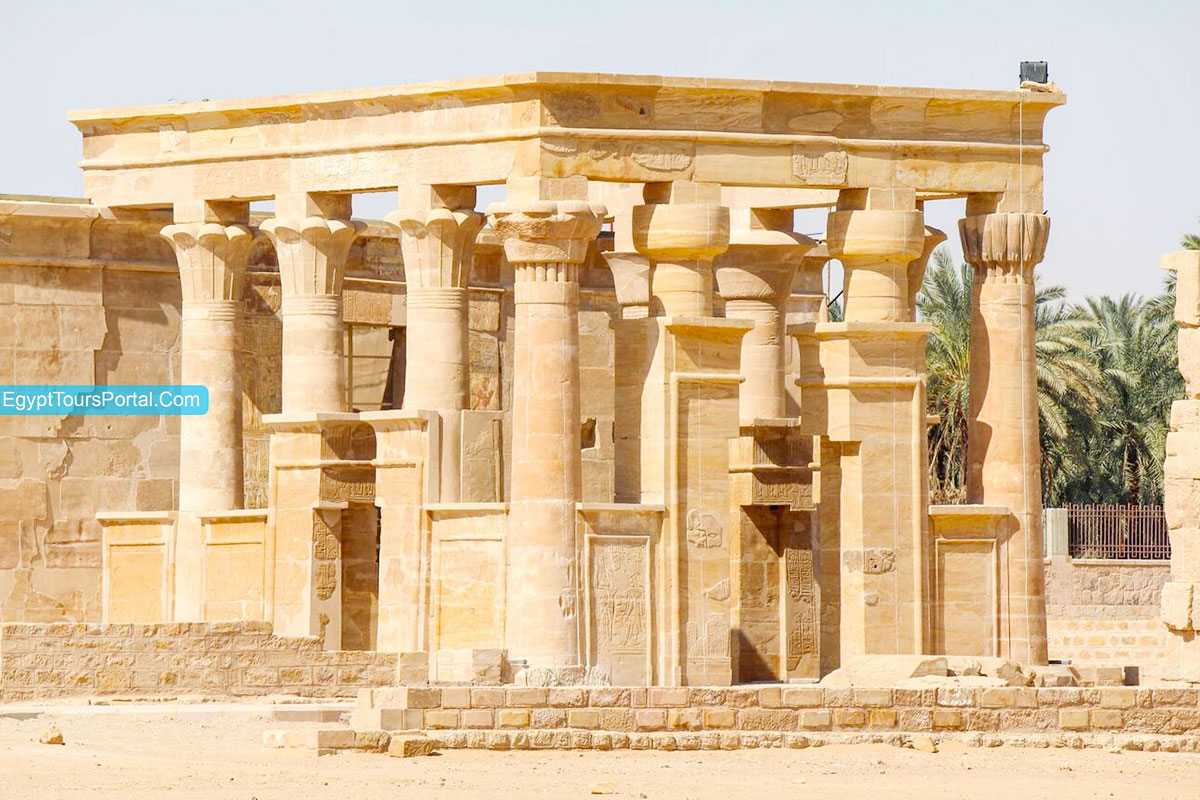
The Temple of Hibis stands as one of the most important ancient sites in Kharga Oasis, which is just one kilometer north of Kharga Oasis which is renowned as the oasis's largest and best-preserved temple and intricate works of art and is filled with some of the most incredible collection of monuments from Pharaonic, Persian, Ptolemaic, Roman, and Coptic ages. Its origins trace back to the Saite-Persian period (664–404 BCE), during Egypt's 26th dynasty, the last period of native rule before the Persian conquest in 525 BCE. The temple offers a glimpse into Egypt's rich history, spanning the Pharaonic, Persian, Ptolemaic, Coptic, and Roman eras through intricate works of art that stood the test of time.
It is dedicated to the Theban triad of Amun, Mut, and Khonsu, as well as Osiris. The Hibis Temple embodies the syncretism of ancient Egyptian religious beliefs. It is known as "Amun of Hibis" the temple which was initiated by Ahmose II and Pharaoh Psamtik II, with completion occurring during the Persian and Hyksos occupation under Darius I in 522 BCE. Substantial expansions took place during the reigns of Nectanebo I (380–362 BCE), Nectanebo II (360–343 BCE), and Ptolemy II (285–246 BCE), including the addition of two outer portals. The temple complex features remarkable elements such as a sacred lake, ports, a lengthy hallway, pylons, and a hypostyle hall adorned with depictions of numerous ancient Egyptian deities. An enchanting feature of the temple is its epic ram sphinx passageways leading to a magnificent Roman gate established in 69 AD. Within the temple's inner sanctum lies a golden chamber adorned with rich inscriptions and exquisite works of art, offering visitors a glimpse into the spiritual and artistic legacy of ancient Egypt.

The Bagawat Cemetery stands as an ancient Christian burial ground, renowned globally for its historical significance and unique architectural style, located just three kilometers north of Kharga, adjacent to the Temple of Hibis. Its name, Bagawat, stems from the Arabic term "Qubwat" referring to the distinctive dome-shaped tombs prevalent in the area.
It dates back from the 3rd to the 7th century AD and served as a refuge for Christians fleeing northern Egypt, seeking sanctuary in the Kharga Oasis. Comprising 263 funerary chapels, the cemetery's layout features small domed structures, with a central church considered one of the oldest Coptic Churches in Egypt. Among its notable attractions is the legendary Tomb of Exodus, which is adorned with intricate carvings that depict various Old Testament and biblical narratives. These include scenes such as Noah's ark portrayed as an "Egyptian Barque" the tales of Adam and Eve, the sacrifice of Abraham, Daniel in the lion's den, Jonah swallowed by a fish, and reliefs depicting figures like Jacob, the Virgin Mary, Saint Paul, and Saint Takla. The tombs within Bagawat Cemetery also boast vibrant and enchanting Coptic writings and inscriptions, offering valuable insights into Coptic life during this pivotal period in history.

The Temple of Ghweita, also known as Qaser Ghweita, translates to "Fortress of Deep Springs" and is situated 25 kilometers south of Kharga. Offering panoramic views of the surrounding landscape, including mountains, sand dunes, and vibrant greenery, the temple highlights the diverse terrain of the region. Alongside the Temple of Hibis, it stands as the sole temple constructed in Egypt during the Persian or Hyksos occupation. The temple's construction dates back to the Middle Kingdom of Egypt and likely began during the reign of Darius I, atop a hill previously occupied by ruins from a Pharaonic settlement.
Dedicated to the holy triad of Amun, Mut, and Khonsu, mirroring the purpose of the Hibis Temple, the Ghweita Temple represents a rare architectural feat from a tumultuous period in Egyptian history. Undergoing expansions during the Ptolemaic era between the 3rd and 1st centuries BC, the temple features significant enhancements, including a hall with eight imposing columns, a hypostyle hall, a courtyard, and a sanctuary adorned with intricate decorations depicting scenes of Hapi, the Nile god, and other symbols representing ancient Egypt's nomes. These additions showcase the temple's rich religious and cultural significance within the region.

The Temple Of Qaser Al Zayyan is a rare gem of history hidden carefully in the golden sands of the oasis, which is found 5 kilometers south of the Temple of Ghweita. This temple was built during the Ptolemaic reign and enlarged during the period of the Roman Emperor Antoninus Pius in 138 AD. The temple of Qaser Al Zayyan was dedicated to the cult of Amun Ra of Hibis. The temple features a dedicatory inscription dating back to August 11, 140 AD, honoring Antoninus Caesar and detailing the restoration efforts.
The main building comprises a courtyard leading to a sanctuary with an elaborate cult niche and an antechamber with a staircase to the roof. Qasr al-Zayyan served as a crucial stop along a major desert route from Esna during the Roman Period, emphasizing its significance as a water source and a resting place for travelers. Today, the site stands as a testament to the architectural and religious practices of ancient Egypt under Roman rule.
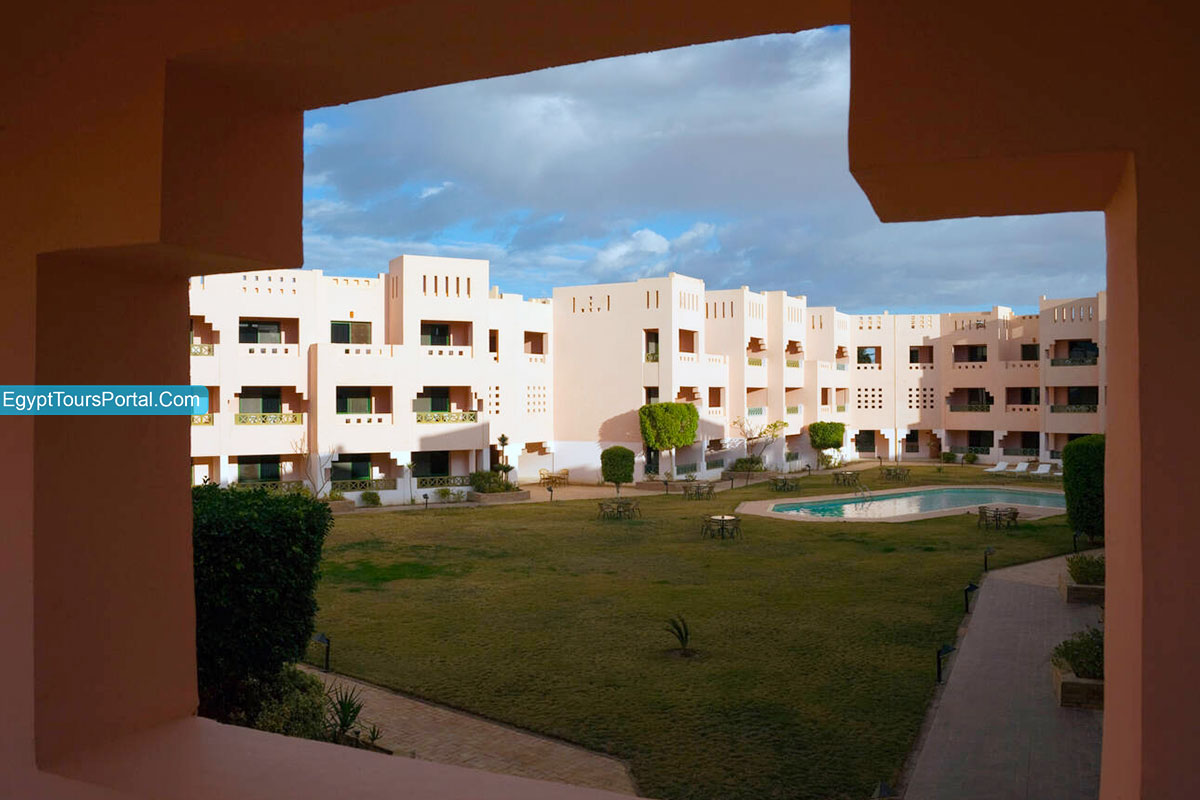
The Kharga Oasis is a magically remote and fascinating destination in the Egyptian desert, which is filled with a variety of hotels to choose from that suit all budgets and needs. Around the area, there are also a number of guesthouses and homestays available in the Kharga Oasis. The most popular options include:
Qasr El Bagawat Hotel is a luxurious hotel located right next to the Qasr El Bagawat necropolis, offering stunning views of the desert landscape, which has a swimming pool, spa, and several restaurants. Solymar Pioneers is a 4-star hotel that is a good option for families, with a water park, kids' club, and several restaurants. It's also located close to the main town of El Kharga. Basata Lodge is a small, eco-friendly lodge, which is a great choice for those looking for a unique and authentic experience. Oasis Hotel is a budget-friendly hotel and is a good option for those who desire to explore the center of town.
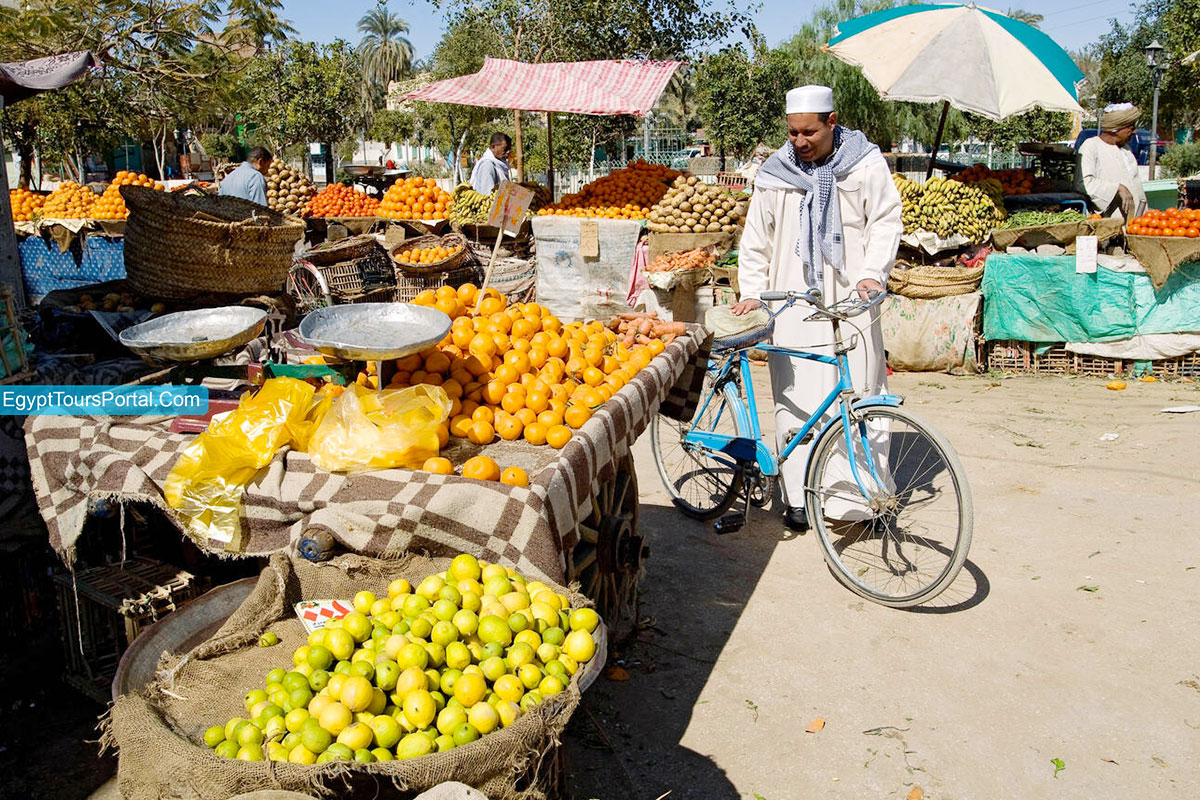
The total population in 2021 of the area is around 101,283, with a density of about 100 people per square kilometer (260 per square mile). The oasis is filled with notable families of Christian and Roman descent that include Al-Jawiya, Al-Bahramah, Al-Tawayh, Al-Sanadiyah, Al-Na’imah, Al-Badayrah, Al-Azayza, Al-Hosnieh, Al-Mahbasiya, Al-Sharayra, as well as Nubian families in Baris village. While there are a few Berber families considered indigenous to Kharga, the majority today are Arab families.
Key Arab families migrating to Kharga from around 300 AH include the Idris family from Tunisia or Libya, the Rekabia family, the Jewehera family from the Hijaz, the Shakawera family, the Al-Radawana family, families from Mecca, the Al-Shawami family from the Levant, as well as Egyptian families like Asawiya and Dabatiya from Sohag or Assiut, Awlad-el-sheikh, and Njarin from Qalamoun in Dakhla. There are Turkish families like Al-Tarakah Al-Kharja and Al-Dabashiya, and the Bash families include Askari, Qaqamqam, Qitas, Tannabur, and Kashif.
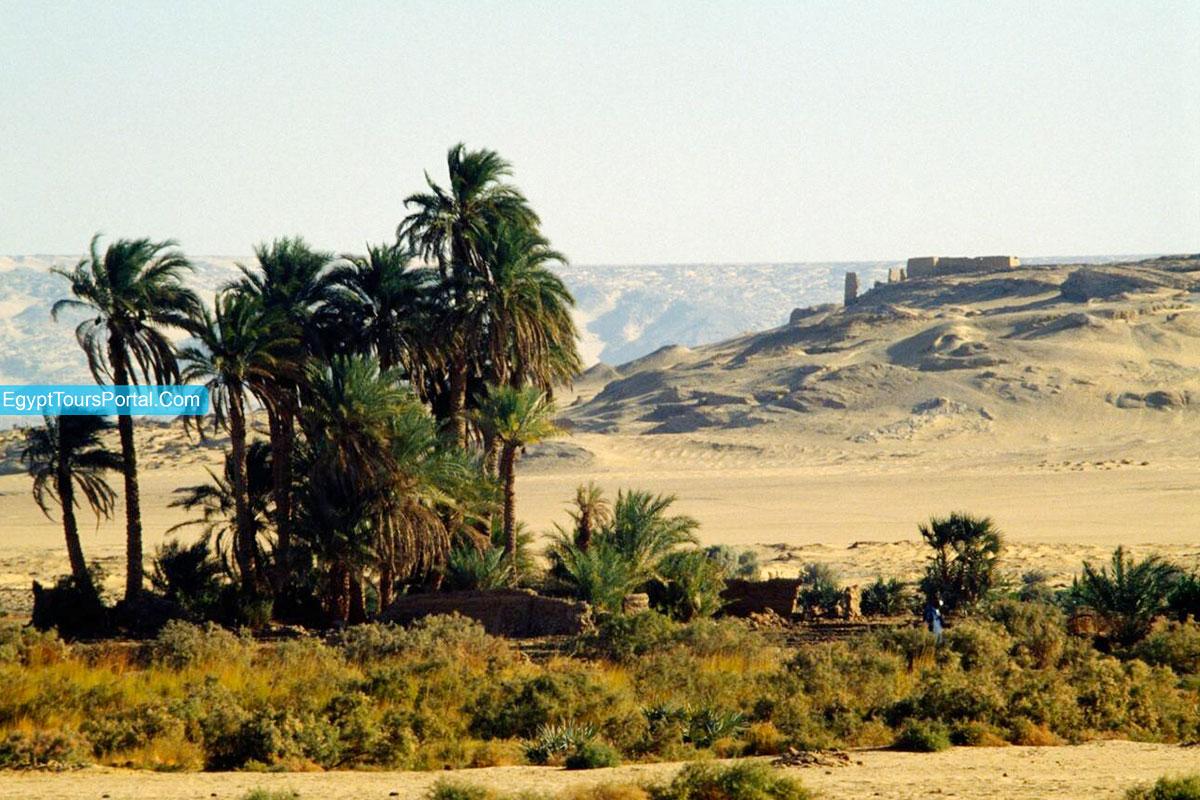
The Kharga Oasis is one of the few places in Egypt that can fully reflect the allure and greatness of the hidden wonders of the ancient Egyptian civilization. Book now your private Egypt tours to discover it and many more historical attractions in Cairo and Alexandria, also check our Nile River Cruises to witness the remarkable artifacts in Luxor and Aswan while enjoying the most charming views of the Nile.
Private 4 Days Cairo Tour Packages for UAE Travelers 4 days Cairo Egypt Tour package...
Tour Location: Cairo – Giza...
5 Days Cairo and Alexandria Tour Package For UAE Travelers 5 days Cairo and Alexandr...
Tour Location: Cairo/Giza/Alexandria...
6 Days Cairo, Luxor & Aswan Tour Package For UAE Travelers 6 days Cairo, Luxor &...
Tour Location: Cairo/Giza/Aswan/Luxor...
Amazing 7 Days Cairo and Hurghada Holiday for UAE Travelers 7 Days Cairo & Hurgh...
Tour Location: Cairo – Giza – Hurgh...
It is located in the Western Desert, in the governorate of the new Valley about 200 km (125 miles) to the west of the Nile valley.
Kharga Oasis is the southernmost of Egypt's five western oases which was known as the 'Southern Oasis' to the Ancient Egyptians and Oasis Magna to the Romans. It is also the name of a major town located in the oasis, the capital of New Valley Governorate.
The entire country of Egypt deserve to be explored with its every heavenly detail but there are places that must be seen before any other such as the breathtaking Hurghada's red sea, The wonders of Cairo the pyramids of Giza, the great sphinx, the Egyptian Museum, Khan El Khalili Bazaar, the wonders of Luxor like Valley of the Kings, Karnak & Hatshepsut temple and the wonders of Aswan such as Abu Simbel temples, Philea temple, Unfinished obelisk and The Wonders of Alexandria like Qaitbat Citadel, Pompey's Pillar and Alexandria Library. Read more about the best places to visit in Egypt.
If you want to apply for a Visa On Arrival that lasts for 30 days then you should be one of the eligible countries, have a valid passport with at least 6 months remaining and pay 25$ USD in cash, as for the E-Visa for 30 day you should have a valid passport for at least 8 months, complete the online application, pay the e-visa fee then print the e-visa to later be presented to the airport border guard. You could also be one of the lucky ones who can obtain a free visa for 90 days. Read more about Egypt travel visa.
Egypt has a variety of delicious cuisines but we recommend “Ful & Ta’meya (Fava Beans and Falafel)”, Mulukhiya, “Koshary”, a traditional Egyptian pasta dish, and Kebab & Kofta, the Egyptian traditional meat dish.
The best time to travel to Egypt is during the winter from September to April as the climate becomes a little tropical accompanied by a magical atmosphere of warm weather with a winter breeze. You will be notified in the week of your trip if the Climate is unsafe and if any changes have been made.
You should pack everything you could ever need in a small bag so you could move easily between your destinations.
We have been creating the finest vacations for more than 20 years around the most majestic destinations in Egypt. Our staff consists of the best operators, guides and drivers who dedicate all of their time & effort to make you have the perfect vacation. All of our tours are customized by Travel, Financial & Time consultants to fit your every possible need during your vacation. It doesn't go without saying that your safety and comfort are our main priority and all of our resources will be directed to provide the finest atmosphere until you return home.
You will feel safe in Egypt as the current atmosphere of the country is quite peaceful after the government took powerful measures like restructuring the entire tourist police to include all the important and tourist attractions in Egypt. Read more about is it safe to travel to Egypt.
Wear whatever feels right and comfortable. It is advised to wear something light and comfortable footwear like a closed-toe shoe to sustain the terrain of Egypt. Put on sun block during your time in Egypt in the summer to protect yourself from the sun.
The best activity is by far boarding a Nile Cruise between Luxor and Aswan or Vise Versa. Witness the beauty of Egypt from a hot balloon or a plane and try all the delicious Egyptian cuisines and drinks plus shopping in old Cairo. Explore the allure and wonders of the red sea in the magical city resorts of Egypt like Hurghada and many more by diving and snorkeling in the marine life or Hurghada. Behold the mesmerizing western desert by a safari trip under the heavenly Egyptian skies.
There are a lot of public holidays in Egypt too many to count either religious or nation, the most important festivals are the holy month of Ramadan which ends with Eid Al Fitr, Christmas and new years eve. Read more about festivals & publich holidays in Egypt.
Egypt is considered to be one of the most liberal Islamic countries but it has become a little bit conservative in the last couple of decades so it is advised to avoid showing your chest, shoulders or legs below the knees.
Arabic is the official language and Most Egyptians, who live in the cities, speak or understand English or at least some English words or phrases. Fewer Egyptians can speak French, Italian, Spanish, and German. Professional tour guides, who work in the tourism sector, are equipped to handle visitors who cannot speak Arabic and they will speak enough English and other languages to fulfill the needs of all our clients.
The fastest way is a car, of course, a taxi. If you are in Cairo ride a white taxi to move faster or you could board the fastest way of transportation in Egypt metro if the roads are in rush hour.
The temperature in Egypt ranges from 37c to 14 c. Summer in Egypt is somehow hot but sometimes it becomes cold at night and winter is cool and mild. The average of low temperatures vary from 9.5 °C in the wintertime to 23 °C in the summertime and the average high temperatures vary from 17 °C in the wintertime to 32 °C in the summertime. The temperature is moderate all along the coasts.
It is the home of everything a traveler might be looking for from amazing historical sites dating to more than 4000 years to enchanting city resorts & beaches. You will live the vacation you deserve as Egypt has everything you could possibly imagine.









